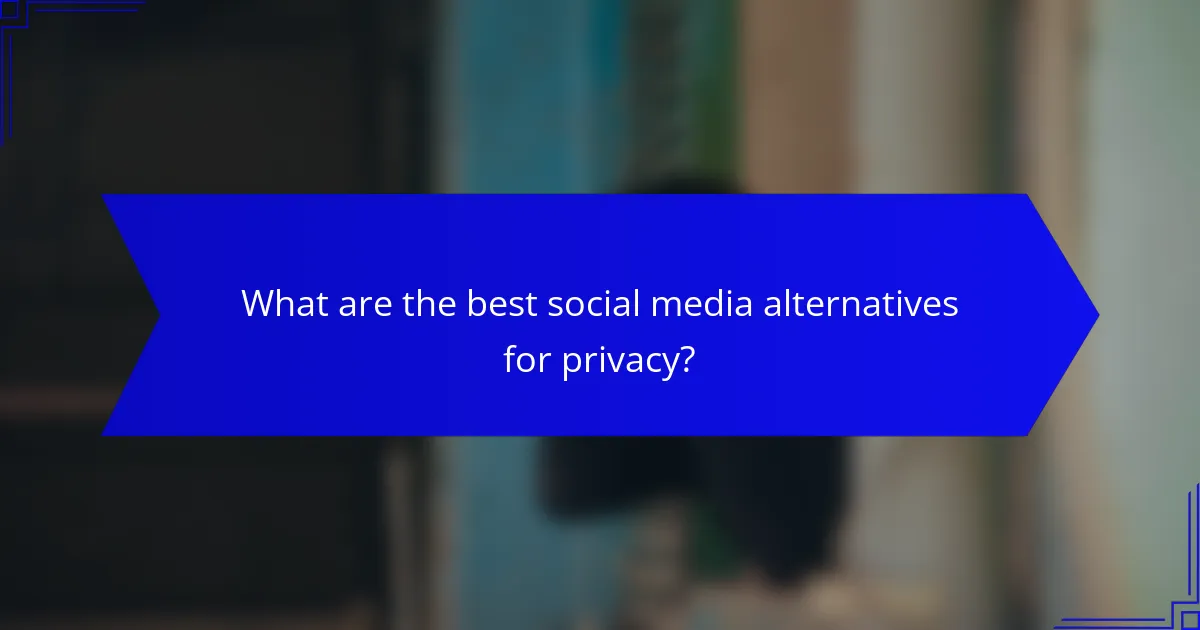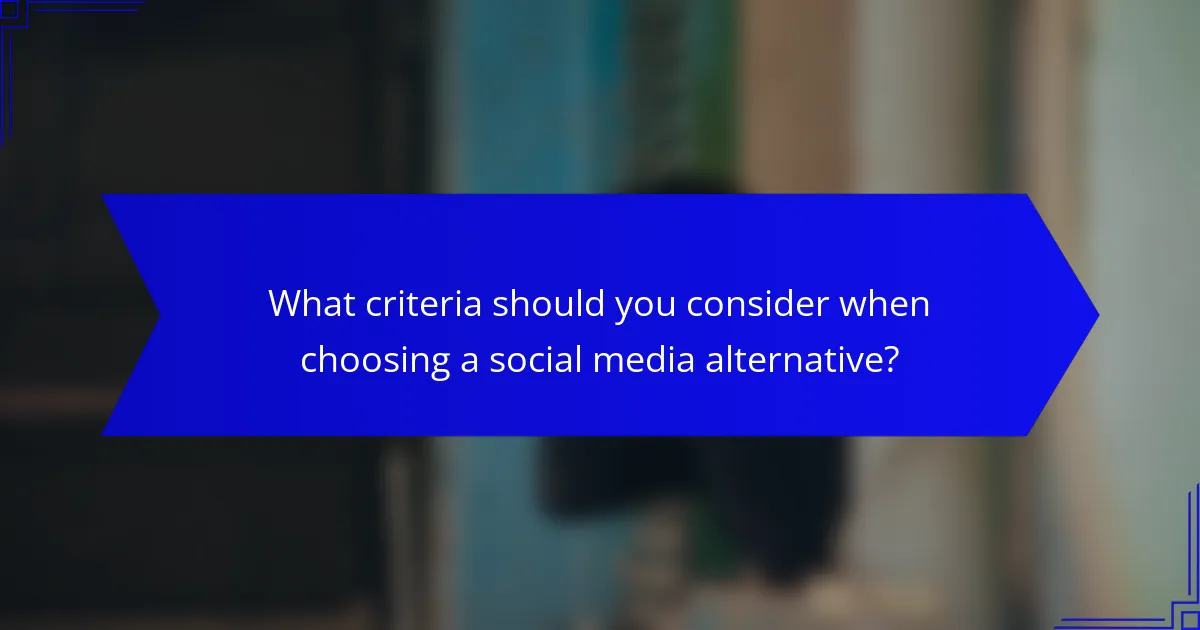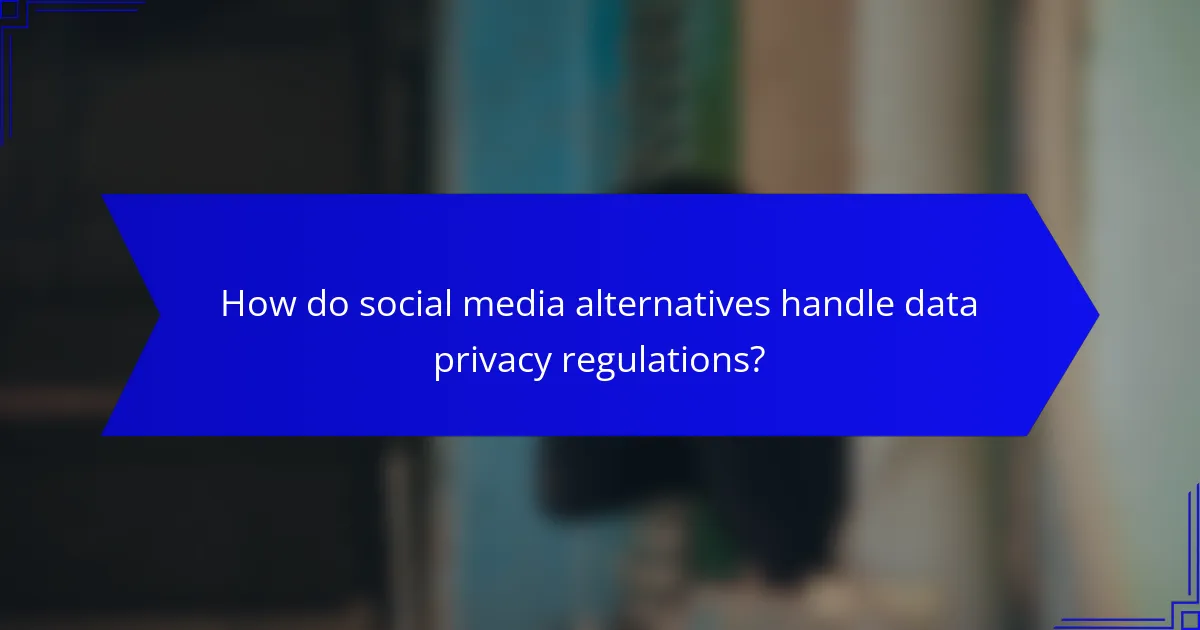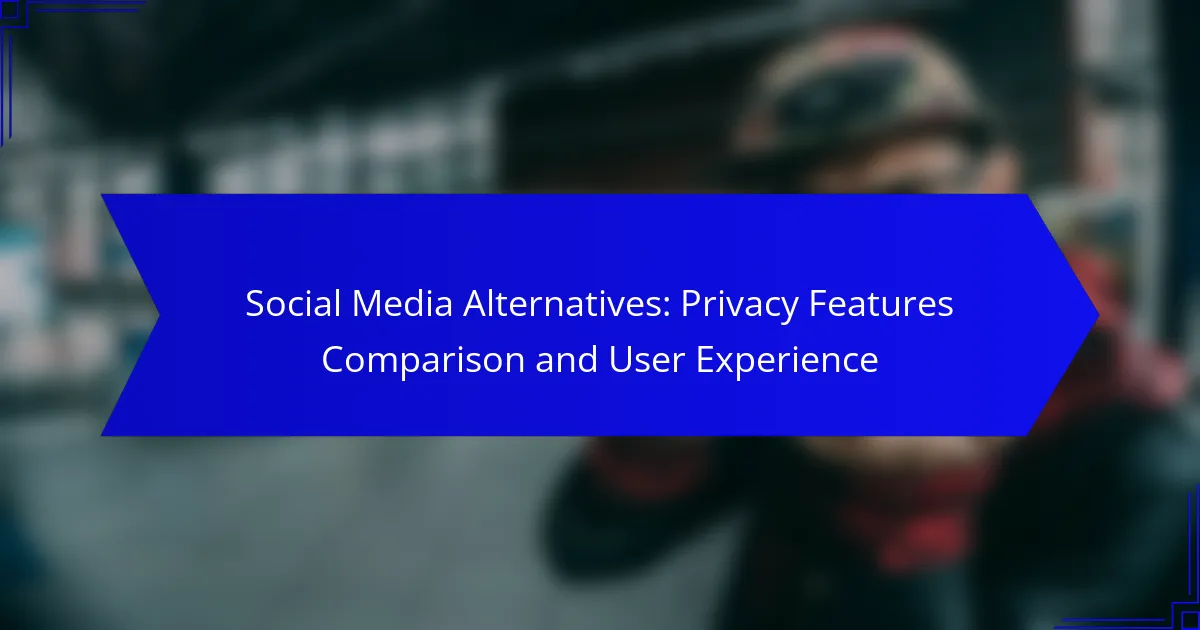As concerns about data privacy grow, many users are seeking social media alternatives that prioritize user protection and limit tracking. These platforms offer a range of privacy features that enhance user experience while safeguarding personal information. Key considerations include end-to-end encryption, data ownership policies, and ad tracking limitations, all of which contribute to a more secure online environment.

What are the best social media alternatives for privacy?
Some of the best social media alternatives for privacy include platforms that prioritize user data protection and limit tracking. These options provide enhanced privacy features while fostering user engagement without compromising personal information.
Mastodon
Mastodon is a decentralized social network that allows users to create or join independent servers, known as instances. Each instance has its own rules and privacy settings, giving users control over their data and interactions.
When using Mastodon, consider the instance’s moderation policies and community guidelines. This ensures a safe environment tailored to your preferences. Additionally, since it operates on a federated model, you can interact with users across different instances while maintaining your privacy.
Signal
Signal is a messaging app that emphasizes end-to-end encryption for all communications, making it a strong alternative for privacy-conscious users. It collects minimal user data and does not store messages on its servers.
To maximize privacy on Signal, enable features like disappearing messages and screen security. These options help prevent unauthorized access to your conversations. Signal’s user-friendly interface makes it easy to communicate securely with friends and family.
MeWe
MeWe is a social media platform that champions user privacy by not selling data or using targeted ads. Users can share content, create groups, and connect with others while maintaining control over their personal information.
MeWe offers features like private messaging and customizable privacy settings. Be mindful of the content you share publicly, as even on privacy-focused platforms, some information may still be visible to others.
Telegram
Telegram is a messaging app that provides both standard and secret chats, with the latter offering end-to-end encryption. While Telegram collects some user data, it allows for extensive privacy settings and self-destructing messages.
To enhance your privacy on Telegram, use secret chats for sensitive conversations and enable two-step verification. Regularly review your privacy settings to ensure they align with your preferences, especially regarding who can see your phone number and profile information.
Vero
Vero is a social media platform that focuses on authentic connections and user privacy. It does not use algorithms to curate content, allowing users to see posts in chronological order without data tracking.
Vero operates on a subscription model, which means it does not rely on advertising revenue. This approach helps maintain user privacy. Be aware that Vero requires access to your contacts for certain features, so review permissions carefully to protect your information.

How do privacy features compare among social media alternatives?
Privacy features among social media alternatives vary significantly, impacting user experience and data security. Key aspects to consider include end-to-end encryption, data ownership policies, ad tracking limitations, and content moderation practices.
End-to-end encryption
End-to-end encryption ensures that only the communicating users can read the messages, preventing unauthorized access from third parties, including the service provider. Platforms like Signal and WhatsApp utilize this feature, making them more secure choices for privacy-conscious users.
When choosing a social media alternative, look for services that explicitly offer end-to-end encryption for all forms of communication, including messages, calls, and shared media. This feature is crucial for maintaining confidentiality in your interactions.
Data ownership policies
Data ownership policies dictate how user data is collected, stored, and utilized by social media platforms. Alternatives like MeWe and Minds emphasize user ownership, allowing individuals to control their data and decide how it is shared.
Before selecting a platform, review its data ownership policy to understand your rights regarding personal information. Opt for services that provide clear guidelines on data usage and offer options for data deletion or export.
Ad tracking limitations
Ad tracking limitations refer to the extent to which platforms collect and share user data for advertising purposes. Social media alternatives such as DuckDuckGo and Vero limit ad tracking, enhancing user privacy by minimizing data collection.
To protect your privacy, choose platforms that prioritize user consent and transparency in ad tracking practices. Look for services that offer ad-free experiences or allow users to opt out of targeted advertising.
Content moderation practices
Content moderation practices determine how platforms handle user-generated content, including the removal of harmful or inappropriate material. Alternatives like Gab and Parler adopt different approaches, often favoring less stringent moderation compared to mainstream platforms.
Consider how a platform’s content moderation aligns with your values. If you prefer a more open environment, select services that encourage free speech while still implementing basic community guidelines to ensure a safe user experience.

What is the user experience like on privacy-focused platforms?
User experience on privacy-focused platforms typically emphasizes user control and data security. These platforms often provide streamlined interfaces and community-driven engagement, prioritizing user privacy over advertising revenue.
Interface design
Privacy-focused platforms often feature minimalist interface designs that reduce distractions and enhance usability. The layout is usually straightforward, allowing users to navigate easily without overwhelming advertisements or intrusive elements.
For example, platforms like Signal and Telegram prioritize clean designs that focus on messaging functionality while ensuring user data remains secure. This simplicity can lead to a more enjoyable user experience, especially for those who value privacy.
Community engagement
Community engagement on privacy-centric platforms tends to be more intimate and focused. Users often share common values regarding privacy, leading to more meaningful interactions and discussions.
Many of these platforms encourage user feedback and community-driven features, such as open-source contributions. This fosters a sense of belonging and trust among users, which can enhance overall satisfaction.
Content discovery
Content discovery on privacy-focused platforms may differ significantly from mainstream social media. These platforms often rely on user recommendations and organic growth rather than algorithms that prioritize engagement metrics.
For instance, platforms like Mastodon allow users to follow specific communities or topics, making it easier to discover content aligned with their interests. However, this can result in a slower content discovery process compared to algorithm-driven platforms, requiring users to actively seek out new connections and content.

What criteria should you consider when choosing a social media alternative?
When selecting a social media alternative, prioritize privacy settings, user base size, and feature set. These factors will significantly influence your experience and the level of control you have over your personal data.
Privacy settings
Privacy settings are crucial for safeguarding your personal information. Look for platforms that offer granular controls, allowing you to manage who can see your posts, friend requests, and personal details. Features like end-to-end encryption and data expiration options enhance your privacy further.
Consider whether the platform has a clear privacy policy and complies with regulations such as GDPR or CCPA. This ensures that your data is handled responsibly and gives you rights over your information.
User base size
The size of a platform’s user base can affect your social media experience. A larger user base typically means more diverse interactions and content, but it may also lead to increased exposure to unwanted attention or data collection practices.
Smaller platforms often foster a more intimate community, which can enhance engagement but may limit the variety of content and connections. Assess your priorities: do you prefer a bustling environment or a close-knit community?
Feature set
Evaluate the feature set of potential social media alternatives to ensure they meet your needs. Essential features may include messaging, multimedia sharing, and community-building tools. Some platforms may offer unique functionalities like anonymous posting or customizable feeds.
Compare the usability of these features, as a more complex interface can detract from your experience. Prioritize platforms that provide a balance of functionality and ease of use, allowing you to navigate without frustration.

How do social media alternatives handle data privacy regulations?
Social media alternatives often prioritize data privacy by adhering to various regulations, such as GDPR in Europe. These platforms implement features that enhance user control over personal data, ensuring compliance and fostering trust.
GDPR compliance
GDPR, or the General Data Protection Regulation, sets strict guidelines for data protection and privacy in the European Union. Social media alternatives that comply with GDPR must provide clear consent mechanisms, allow users to access their data, and enable easy data deletion.
Platforms typically achieve compliance by implementing features like privacy settings, data export options, and transparent privacy policies. For example, users should be able to see what data is collected and how it is used, which enhances transparency and accountability.
To ensure compliance, users should look for platforms that regularly update their privacy policies and provide tools for managing personal information. Avoid platforms with vague terms or those that do not offer straightforward methods for data control.
